- Home
- C. G. Cooper
Backdrop: A Corps Justice Series (Stars & Spies Book 1)
Backdrop: A Corps Justice Series (Stars & Spies Book 1) Read online
Backdrop
A Corps Justice Series
C. G. Cooper
Logan Taylor
Backdrop
Book 1 of the Stars & Spies Series
A Corps Justice Series
Copyright © 2017 JBD Entertainment, LLC. All Rights Reserved
Author: C. G. Cooper
Co-Author: Logan Taylor
Get a FREE copy of Adrift, the first book in the Daniel Briggs spinoff, just for subscribing at http://CG-Cooper.com
This is a work of fiction. Characters, names, locations and events are all products of the author’s imagination. Any similarities to actual events or real persons are completely coincidental.
Any unauthorized reproduction of this work is strictly prohibited.
Contents
Prologue
Chapter 1
Chapter 2
Chapter 3
Chapter 4
Chapter 5
Chapter 6
Chapter 7
Chapter 8
Chapter 9
Chapter 10
Chapter 11
Chapter 12
Chapter 13
Chapter 14
Chapter 15
Chapter 16
Chapter 17
Chapter 18
Chapter 19
Chapter 20
Chapter 21
Chapter 22
Chapter 23
Chapter 24
Chapter 25
Chapter 26
Chapter 27
Chapter 28
Chapter 29
Chapter 30
Chapter 31
Chapter 32
Chapter 33
Chapter 34
Chapter 35
Chapter 36
Chapter 37
Chapter 38
Chapter 39
Chapter 40
Chapter 41
Chapter 42
Chapter 43
Chapter 44
Chapter 45
Chapter 46
Chapter 47
Chapter 48
Chapter 49
Chapter 50
Chapter 51
Chapter 52
Chapter 53
Chapter 54
Chapter 55
Epilogue
Acknowledgments
Also by C. G. Cooper
Prologue
Al-Ula, Saudi Arabia
The row of six black SUVs traveled along the highway under a heavy sun; the light thick enough, even through the black-tinted windows, to make the men lean away from the rays. The road was in good repair for a ribbon of tar that had to endure the desert heat during the days—and the desert chill during the nights. The tires hummed along smoothly.
Ahead of them, the road shimmered like a pool of still water—a distant oasis, but without the palm trees that would have marked it as a real place instead of a mere heat illusion. But there was a hint of green among the rocky outcroppings that rose over the desert floor; a sure sign of water, most of it held in reservoirs under the ground, lest it evaporate in the summer heat.
Often, in the desert, that which is hidden is that which is preserved.
They had almost reached their destination, Al-Ula, where the Prophet (peace and blessings be upon him) had once passed through on his campaign to Tabuk. It was a city divided by time—the ancient ghost-town on one side, topped by the Castle Musa bin Nasir, and the modern town on the other, featuring hotels, mosques, cafés. And a date palm plantation, its jewel-colored trees in neat rows between the plateaus surrounding them. The old town officially died in 1985, when the last service was held in the old mosque, following that it rose as a ghost-town. Now, two-thousand-year-old ruins lay rotting in the heat, and within the blanched ridge of stone topped by the castle. The inhabitants of the area now lived in the town nearby.
The drivers turned onto a side road that was rougher than the main highway, then onto a series of gravel roads that became progressively less like roads and more like narrow rock gardens. Then they simply became ancient stone pathways winding up the plateau. Finally they stopped, all six SUVs, at a rocky ledge overlooking the desert. They were above the date palm plantation. One outcropping hid them from below; another hid them from the ancient castle across the small valley that held the old town.
They were in place in under an hour. The only thing left to do was wait for the first dominos in America to fall, exactly in the manner their masters had so carefully planned.
Chapter One
Andy suspected that the situation was even nuttier than it seemed on the surface.
The scuttlebutt throughout the Washington metropolitan area was that Kingsley Coles, Deputy Director, National Clandestine Service of the CIA, was off his rocker. Coles had always been known as ruthless, cold-blooded, and uncontrollable, but lately his actions were throwing the agency for a loop. Firing agents, hiring outsiders, withholding communications, issuing bogus communiques. Rumor now had it he was working on some program that would take the crazy cake. And only Andy had any inkling of just how crummy that cake was.
Former Major Bartholomew “Andy” Andrews, USMC, had been playing errand-boy for Coles for a few months on the CIA payroll. Delivering messages, meeting contacts, sitting in on meetings to take notes. Overhearing conversations and reporting useless water-cooler talk back to Coles on a regular basis. A glorified gopher with a tiny bit of responsibility… and a masochistic penchant for riding his boss's ass to get something worthwhile to work on. But the Marine had come onboard to affect change, not to fetch coffee.
He'd been pressing the Deputy Director to let him clean house in the CIA. Some bad apples had worked their way into the agency. Coles said he wanted a purge. One of those bad apples had leaked information getting Andy’s men killed and himself captured by hostiles. Getting disavowed by your own government tends to light a fire under one’s backside. All the more disappointing for Andy was realizing that the whole affair was turning into a colossal waste of time.
Coles’s office at CIA headquarters in Langley was the kind of place where Andy felt the least at home: spotlessly clean, expensive, and very, very breakable. The whole room practically beckoned him to saunter past the sophisticated-looking glass table in the corner and give the Chinese vase precariously poised on top of it the ol' elbow nudge.
He restrained himself, as he always did, and took a seat.
“So, Mr. Andrews,” Kingsley Coles said from the other side of the desk, his tone reminiscent, as ever, of Mr. Smith addressing Keanu Reeves as “Mr. Anderson” in The Matrix. Dressed in a gray suit with blue pinstripes, silver tie, and glistening gold cufflinks, Coles leaned back in his silver Herman Miller chair, which made him look like the captain of an alien spaceship or a Bond villain. “What's Mueller’s office saying about me?”
“Nothing. Topics related to Kingsley Coles are strictly off the table, either formally during meetings or anywhere in my hearing.”
“Excellent.”
The absence of gossip, in this case, was a good thing. Both men were well aware that agents chatted about Coles right in front of Andy without a second thought, knowing full well the latter reported everything he heard to the former. It had never ceased to amaze Andy how loose-lipped CIA personnel were in that regard. He knew from experience that although the Marines could be a real cathouse for gossip, they had nothing on the loose lips in Langley. It was another class of gossip entirely.
Andy studied his boss's eyes. “Mind telling me what’s going on?”
The granite-faced man pursed his lips. “You don’t n
eed to know. But I'll need you to see a stylist this afternoon.”
“A stylist?”
“I’m sending you to California. You'll need to look the part.”
Andy raised an eyebrow. “California, huh?”
“At least you’re tan enough.”
“Well, I've been working on my surfer dude look all month. As a matter of fact, I just bought stock in a board shorts company. Glad it's paying off.”
“Mr. Andrews, your duty location, and sartorial choices belong to the CIA now. I will use you as I see fit. Is that clear?”
“Crystal.”
“Excellent. Now shut your hole. We have reason to believe that a terrorist cell from Saudi Arabia is trying to establish a toehold in Hollywood. Wealthy younger sons pose as playboys looking to produce.”
“What are they going to do, bomb the Oscars’ red carpet ceremony? More power to them.”
Coles ignored the crack. “We have intel that a casting director by the name of Serena Ashburn may be involved with the Saudis.”
“Like how involved?”
“Like in the worst way. She’s dating Prince Mansour bin Saladin al Saud.”
“How sweet.”
“Yeah, well you’re going to find out where her loyalties lie. There's more information in her dossier, which you'll have in your possession.”
Not just California, then. Hollywood. Oh joy of joys.
“Sounds great,” he said.
“I’m sending you in as a consultant on a film. It’s about a special forces team inserted into Afghanistan. The team is betrayed over politics and—”
“You’ve got to be joking.”
“Look at my face. Does it look like I'm joking?”
“That's pretty much an exact description of—" he froze. It was an exact description of the mission Coles had him sent on—the one that had gotten his men killed.
Coles’ face remained as hard as ever. “This is not a joke and not a vacation, Andrews. The Saudis, for whatever reason, are planning to spend hundreds of millions of dollars on the film, which will be shot on location in Saudi Arabia and other locations in the Mideast. The production will involve flying dozens of Saudis, Afghanis, and their equipment back and forth to California for filming. In private jets. With little oversight. Understand? We can either let the Saudis have a chance to buy up Hollywood’s loyalty, or we can put our own people in place. Chatter is leading us to believe there will be a major incident during filming. Now, either you will be there to handle the situation, or someone else will.”
Andy leaned back in the expensive chair and crossed his arms over his chest. He wasn’t the only one whose abilities—and loyalty—were about to be tested.
Coles was on trial too as far as Andy was concerned.
With a grin and a shrug, he said, “I’m in.”
Chapter Two
The Burbank/Bob Hope Airport was closer to Hollywood than LAX. Less traffic. The fact that it would take him past the Hollywood sign was just an extra dollop of joy on the assignment. He’d been through here before.
At the rental desk, a golden-haired matron offered him an upgrade. “I can give you a Prius or a Charger SRT Hellcat. They both come in red.”
Andy was more used to helicopters, Humvees, and the backs of covered truck beds filled with goats. Hybrid vs. sports car was not a choice he could make with ease.
“Just a standard sedan,” he said. “And not red.”
“Mm-hmm. Keeping a low profile,” the woman said.
He gave her a look, unnoticed, as she was typing away on her computer.
“I'll just need your driver's license.”
He handed it over. “You get a lot of movie stars through here?”
She glanced up, and her eyes widened slightly. “Oh, I thought you were—” she chuckled. “Never mind. Some of these people, you’d never know to look at them with their makeup off. I had Drew Barrymore come through last week; I didn’t recognize her until I saw her driver’s license.”
“I’m just your garden variety citizen.”
“And what brings you to our fair city?”
“Consulting on a movie. They didn’t have any of their regular guys on hand so they had to ship in a couple of ugly out-of-towners.”
She chuckled again, filled in a few more fields, then handed his license back with two fingers. She gave him a dark gray Chevy SS—boring-looking, but with a six-speed manual V8 engine and 415 horsepower—with a wink.
Burbank was shabby palm trees, cracked roads, one-story cement buildings, and everything bleached that faced the sun. He kept having flashbacks to Turkey. When the flat, featureless plain opened up into heat-baked hills, it felt like déjà vu. It really was like driving into Istanbul from the west. Rocky hillsides were like miniature mountains covered with brush, a few trees sprinkled by the roadsides giving a hint of green. Until he passed Universal Studios, he caught himself on more than one occasion double-checking the signs to make sure they were in English and not Turkish.
The GPS tossed him onto the freeway. He’d been lucky up to that point, only a few miles to drive in the thick part of the traffic. Then, suddenly, he was in the million-wheeled worm again. One thing it did was give him a chance to observe the scenery more closely. For a town full of rich people, it was rather shabby. About the only things that looked good were the restaurants. Gray-washed steel tube fences lined the sides of the roads. Lots of stucco and haciendas with peeling paint. And what was it with all the razor wire? It was like Gitmo with taco trucks.
He had to laugh. The fact that Hollywood reminded him of a foreign country was ironically making him feel more comfortable.
He pulled up in front of the place where he was supposed to meet Serena Ashburn and double-checked the address. It was a two-story stucco building packed tightly within a block full of two-story stucco buildings, no windows except for the front door—glass-backed, heavy, light-blocking curtains—and metered parking all along the front. None of the metered spots were taken. The side road—not metered—was packed with cars, as was the lot behind the building. For the most part, the cars in the lot were shabby. No red sports cars. Not a single Prius. Along the side street, at least three RVs and two vans with trailer campers. He parallel-parked the Chevy down the street, locked it, and wondered if it would be keyed or stolen by the time he got back.
Welcome to Hollywood.
Chapter Three
“Name?”
“Andrews. Looking for Serena Ashburn.”
The keyboard behind the chest-high desk rattled. The receptionist for the Griffith Casting and Film Company looked like an old-fashioned librarian, with gold spectacles halfway down her long nose and a gold chain around her neck. The A/C was cranked high enough in the lobby to warrant the dark blue cardigan she wore.
She picked up the phone and spoke into the receiver. “Ms. Ashburn? Your consultant is here... uh-huh.” She looked up at him over the rims of her glasses. “Yeah... yeah. The real action-hero type. Okay.” She hung up. “Take the stairs to your left, second floor, third door on the right.”
The industrial carpet on the stairs had a dark stain in the center. The stairs creaked underfoot, firmly exhibiting their cheap construction. The handrail felt tacky. At a guess, the place had been built sometime during the Johnson administration and was last updated during the Carter administration.
The second-floor corridor was about twice the width of a typical hallway and packed with young men sitting on gray folding chairs, knees bobbing, some with scripts in their laps. The hallway stank the way one would expect when crammed with a bunch of nervous guys doused with musky cologne: Eau du Desperation competed with Essence of Broken Dreams. The walls were covered with cork boards pinned with lists.
The third door on the right was closed. A dozen pairs of actor eyes watched him as he walked toward it, stopped for a moment to listen, then knocked.
Woman’s voice: “Yes?”
“Andrews.”
“Come in.”
&n
bsp; The first thing that hit him was the warmth of the room. Bright white lights on tripods were aimed at the ceiling, the floor, the walls—everywhere, it seemed, except at the pair of white chairs on the far side of the room. A small video camera stood aimed at these. Behind the lights was a table with two women sitting at it: a black woman in a low-key, polka-dotted blouse, and a Hispanic woman in what looked like a dress made out of different-patterned handkerchiefs. The sleeves were loose and the neckline low enough for him to see her belly button.
“Andrews,” he said, leaning forward to offer a hand to whomever would take it. He gave them a smile that would melt the Alps.
They stared at him like yesterday’s fish wrapped in last week's newspaper.
“The consultant,” he added.
“We know,” the black woman said dryly. “We’re just sizing you up. Welcome to Hollywood, where briefcases eat you alive.” She held out her hand. “Marjorie Barnes. I’m the writer.”
He shook it. It was like shaking a solid five-pound steak. He turned to the other woman. “You must be Serena Ashburn.”

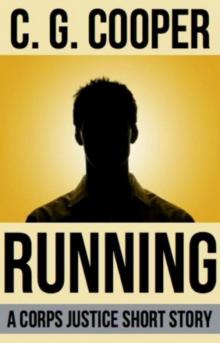 Running
Running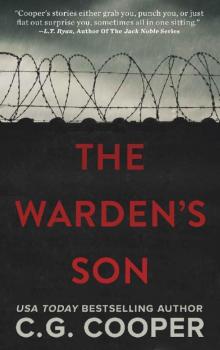 The Warden's Son
The Warden's Son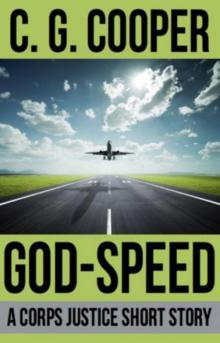 God-Speed
God-Speed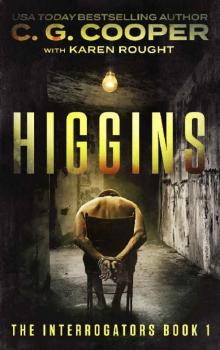 Higgins
Higgins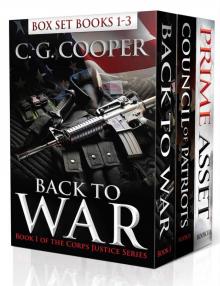 Corps Justice Boxed Set: Books 1-3: Back to War, Council of Patriots, Prime Asset - Military Thrillers
Corps Justice Boxed Set: Books 1-3: Back to War, Council of Patriots, Prime Asset - Military Thrillers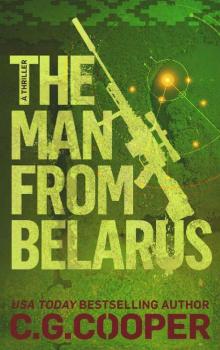 The Man From Belarus (Corps Justice Book 16)
The Man From Belarus (Corps Justice Book 16)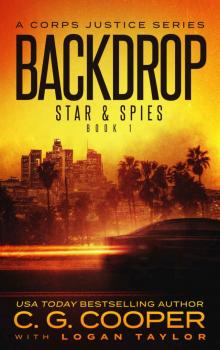 Backdrop: A Corps Justice Series (Stars & Spies Book 1)
Backdrop: A Corps Justice Series (Stars & Spies Book 1)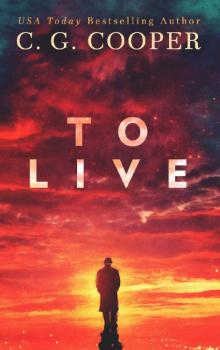 To Live
To Live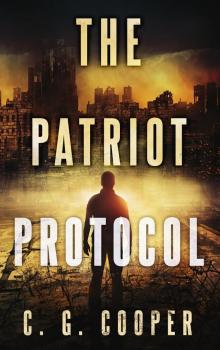 The Patriot Protocol
The Patriot Protocol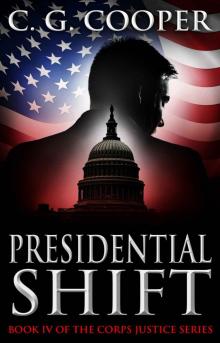 Presidential Shift
Presidential Shift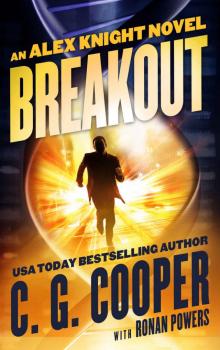 Breakout (Alex Knight Book 1)
Breakout (Alex Knight Book 1)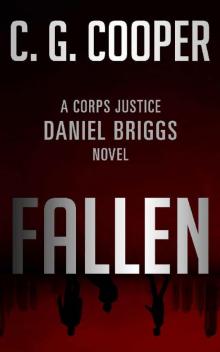 Fallen: A Daniel Briggs Action Thriller (Corps Justice - Daniel Briggs Book 2)
Fallen: A Daniel Briggs Action Thriller (Corps Justice - Daniel Briggs Book 2)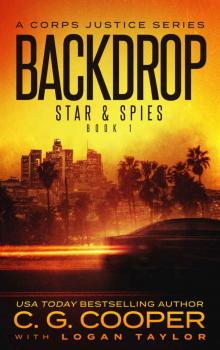 Backdrop
Backdrop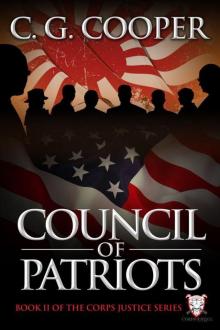 Council of Patriots (The Corps Justice Series Marine Corps Fiction)
Council of Patriots (The Corps Justice Series Marine Corps Fiction)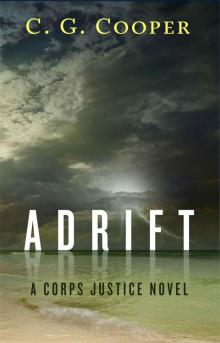 Adrift: The Complete Novel
Adrift: The Complete Novel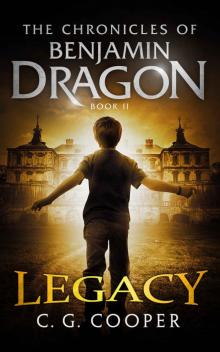 Benjamin Dragon - Legacy (The Chronicles of Benjamin Dragon Book 2)
Benjamin Dragon - Legacy (The Chronicles of Benjamin Dragon Book 2)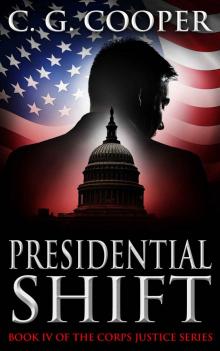 Presidential Shift: A Political Thriller (Corps Justice Book 4)
Presidential Shift: A Political Thriller (Corps Justice Book 4)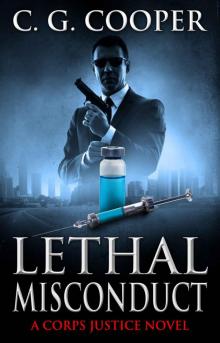 Lethal Misconduct
Lethal Misconduct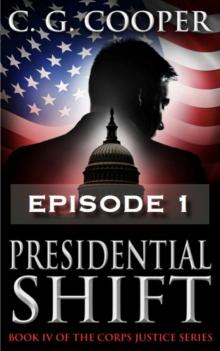 Presidential Shift - Episode 1
Presidential Shift - Episode 1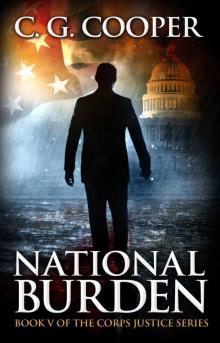 National Burden
National Burden Sabotage
Sabotage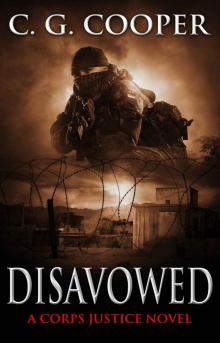 Disavowed
Disavowed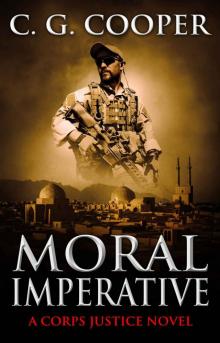 Moral Imperative
Moral Imperative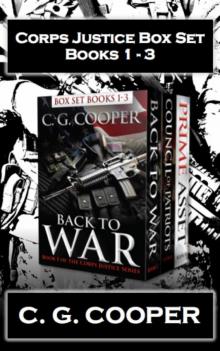 Corps Justice Boxed Set: Books 1-3: Back to War, Council of Patriots, Prime Asset
Corps Justice Boxed Set: Books 1-3: Back to War, Council of Patriots, Prime Asset